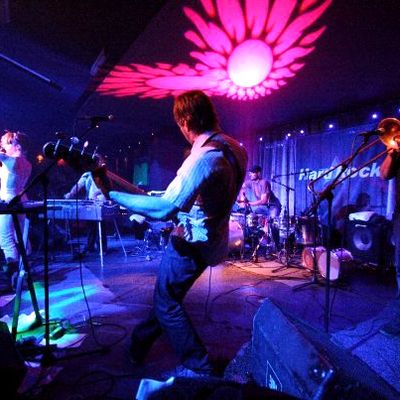
There are people who’ll be excited to hear that Brazilian Girls have regrouped — judging by the enthusiasm at the New York band’s Brooklyn Bowl reunion last night, there are people who’ll be very excited — but it’s hard to describe exactly who those people are. It’s a diverse bunch. Sometimes you’re two blocks away from a concert and can already spot the similarities of everyone who’s headed there alongside you. If you can manage that with Brazilian Girls, it’s probably because you’ve noticed everyone around you seems different, assorted and cosmopolitan, as if someone in the area’s casting dance-club extras for a hip television show.
That’s always been the appeal of the group’s music, which is no easier to pin down. It manages to blend together a huge number of ideas without ever making much fuss out of it or seeming to try very hard; it wanders from place to place like it’s switching terminals at an international airport. Brazilian Girls began as a four-piece band at the downtown club Nublu: dance and Latin rhythms played on live bass and drums, with keyboardist Didi Gutman offering gutted, ethereal takes on the mechanics of house music, dub, electro, down-tempo, and everything else around. It’s onetime jazz singer Sabina Sciubba who steals focus, though; she’s possessed of a low, earthy voice, and takes a sort of pan-European approach to the pop vocals, swinging from ballads to playful melodies to crowd-teasing chants. (Songs on their second LP seemed to take after everyone from Sade to Edith Piaf to Björk, but Sciubba never fails to sound mostly like herself: easygoing, ironic, and glamorous, with a skipping, conversational vocal cadence that occasionally resembles Paul Simon’s.)
At its best, the combination’s hard to call anything apart from “pop,” of a sneakily sophisticated variety. Over the course of three albums, Brazilian Girls gradually shed some of their house-band tricks (drawn-out jams, crowd-pleasing marijuana shout-outs) and made music more elegant and ambitious than they ever seemed to get credit for: “St. Petersburg,” the lead track on 2008’s New York City, is marvelous enough to deserve the kind of chin-scratching admiration normally reserved for big-name indie acts. It’s sonically cosmopolitan stuff, made by literally cosmopolitan people: Sciubba is German-Italian, fluent in six languages, and sings in a free-roving combination of five; Gutman’s from Buenos Aires and the winner of a Latin Grammy; at the moment, Sciubba is living in Paris, while Gutman and drummer Aaron Johnston are in Madrid …
That’s where things stand, anyway, after their brief breakup, which followed a stint of interpersonal turmoil and playing fewer and fewer shows. “We were all a bit burnt out,” says Sciubba, who seems exactly as relaxed, warm, and articulate as she does on record. “We needed to find a different balance. Things had gone into disequilibrium. I think it was a good thing for all of us, individually and collectively — we could do different projects, live out our fantasies.” For her, that included guest singing, solo recording, and writing a “musical tale” with composer Anthony Korf: Goldkind, which premiered last year at Lincoln Center. Then there were the babies: “We had seven children amongst the four of us, in only four years.”
Backstage at Brooklyn Bowl, her 8-month-old daughter is gurgling on the couch; multiple strollers are about. “There were never any musical issues,” Sciubba says. “It was more like energies, personal stuff. So the music still feels great, and it still feels great to write together. We have almost half a record recorded, and I think the best song we’ve ever written is one of those songs.” They’re hoping to finish it in Madrid this fall and find a way to release it early next year.
During the show, Sciubba presses the hands of fans in the front row and plays with one woman’s braids; when she invites people on stage to dance, some of them want to lean close and talk to her instead. She dances with the sort of absent, imposing, arms-up sway particular to tall women with long hair. Years ago, she managed to perform without ever revealing her eyes, appearing in perforated eyebands and veils. Tonight her face is exposed, but she’s wrapped her chest in a large drawing pad, from which she tears sheets of paper to reveal different torsos, drawn in marker: a suit with a “CEO” nametag, a tank top with “MILK” written over the breasts, an ape, a cat, a robot, and eventually some paper nudity. (“Oh, you like that?” she asks the audience. “You’re so cheap!”)
It takes a few songs for the band to get its footing, and some of the fine detail in Gutman’s playing gets lost among the drums (including percussion from the band’s first genuinely Brazilian contributor), but at some point they begin to shine, the songs sounding lithe and sturdy. Sciubba’s right: There’s at least one new song, a swooning, ecstatic number, that feels like it might be in competition with “St. Petersburg,” “Don’t Stop,” and “Sweatshop” for the title of Best Thing They’ve Ever Written. It’s their past as a house band that comes in handy here, though: the loose, slinky jams; the clatter of percussion; the way Sciubba gets dozens of people onstage to chant and dance alongside her; the way the energy level swells and swells into the encore. In the end, there’s a common thread to this audience, which is that most of them came to dance. It seems good to have a band like this back around for a while, if only because they’re one of few groups that can start where they started — skilled musicians, playing something like dance music on live instruments — and wind up with such a rare and flexible version of pop.




